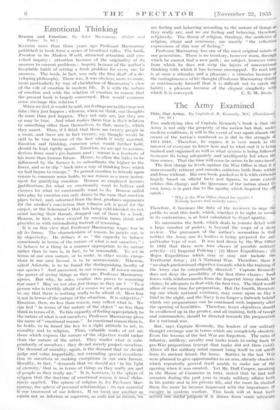Emotional Thinking
Reason and Emotion. By John Macmurray. (Faber and • Faber. 7s. 6d.) R.A.Tima more than three years ago Professcir Macmurray published in book form a series of broadcast talks. The book, Freedom in the Modern World, attracted attention and pro- voked inquiry : attention because of the originality of its answers to current problems ; inquiry because of the author's invariable habit of setting a fresh problem for every one he answers. The book, in fact, was only the first draft of it de- veloping philosophy. There was, it was obtiouS, more to come, more particularly by way of elucidation of-Macmurray,s view of the role of emotion in modern life. It is with the nature of emotion and with the relation of emotion to reason that the present book is largely concerned. How would common sense envisage this relation ?
When we feel, it would be said, our feelings are neither true nor false ; they just happen ; whereas, when we think, our thoughts do more than just happen. They not only are, but they are or may be true: And what makes them true is their relation to something other than themselves, to that, namely, which they assert. Thus, if I think that there are twenty people in it: room, and there are in fact twenty, my thought, would be said to be true because of the fact which' it• truly asserted. Emotion and thinking, common sense would further hold, should be kept rigidly apart. Emotion, we are apt to assume, derives from man's pre-human past ; reason is a foretaste of his more than human future. Hence, to allow the latter to be influenced by the former is to subordinate the higher to the lower, and so to slip " back into a way of thinking from which we had begun to emerge." To permit emotion to intrude upon reason is, common sense holds, to use reason as a mere instru- 'tent for gratifying emotion. Reason so employed invents • jostifications for what we emotionally want to believe and excuses for what we emotionally want to do. Reason called into play by emotion can only dance to the tune that. emotion pipes to her, and, suborned from the first, produces.argumcnts lee the smoker's conviction that tobacco ash is good for the carpet, or the fisherman's that fish being cold-blooded do not nimd having their throats dragged out of 'them by a hook. Reason, in fact, when swayed by emotion turns cheat and pi'oyides us with rationalising instead of reasoning.
It is on this view that Professor Macmurray wages war in ap its forms. The characteristic of reason, he points out, is its objectivity. He defines it as " the capacity to behave consciously in terms of the nature of what is not ourselves " ;
•
to behave to a thing in a manner appropriate to its nature rother than to ours is, in fact, to be reasonable. To act in terms of our own nature, or to make, in other words, excep- tions in our own favour, is to be unreasonable. Wherein, asked Aristotle, is to be found the distinguishing faculty of t • opr species ? And answered, in our reason. If reason means the power of seeing things as they are, Professor Macmurray agrees. But why, he asks, confine this power to reasoning tout court ? May we not also feel things as they are ? To a person who is terribly afraid of a mouse we are all accustomed to say that there is nothing really to he afraid of. Here fear not in terms of the nature of the situation. It is subjective." Emotion, then, no less than reason, may reflect what is. We can feel " in terms of nature of the object " no less than think in terms of it. To this capacity of feeling appropriately to the nature of what is not ourselves, Professor Macmurray gives the name of " emotional reason." In emotional reason there is, he holds, to be. found the key to a yight attitude to art, to Morality and to religion. Thus, valuable works of art are those which express the nature of the objective world rather than the nature of the artist. They render what is incle, pendently of ourselves ; they do not merely project ourselves. The demand of morality, again, is the demand that we should jUdge and valtie•iriapartially, not extending special considera- tion to ourselveS,or 'Making exceptions in ottr Own favour. Morality, in fact, " demands that we should act ' in the light of eternity,' that is, in terms of things .as theyreally.nre and of people as they really am". It is, however, thx; sphere. of religion that the doctrine of emotional - reason Is iriOst' elabo- rately applied. The sphere of religion is, for Professor Mae- Murray, the sphere of personal relationships ; its raw material i our treatment of our fellows.. If we treatone.another as equals not as inferiors or superiors, as ends ihoeia arc feeling and behaving according to the nature of things as they really are, and we are feeling and behaving, therefore; religiously. The theory of religion, theology, the aesthetics (4 religion, • ritual and ceremony, are merely " the reflectiO expressions of this way of feeling." Professor Macmurray has one of the most original minds Of our generation. There is no territory, however worn, through which lie cannot find a new path ; no subject, however trite, from which he does not strip the layers of conventional thinking with which it has become enwrapped. To read him is at' once a stimulus and a: pleasure :- -a- stimulus because of the contagiousness of his thought (Professor Macmurray so continuously himself that it is difficult not to catch habit) ; a pleasure because of the elegant simplicity with






























































































 Previous page
Previous page